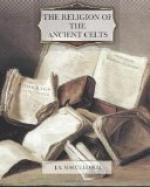FOOTNOTES:
[1002] Pliny, HN xvi. 249.
[1003] D’Arbois, Les Druides, 85, following Thurneysen.
[1004] D’Arbois, op. cit. 12 f.; Deloche, Revue des Deux Mondes, xxxiv. 466; Desjardins, Geog. de la Gaule Romaine, ii. 518.
[1005] Caesar, vi. 13.
[1006] Pliny, HN xxx. 1.
[1007] Rh[^y]s, CB{4} 69 f.
[1008] Gomme, Ethnol. in Folk-lore, 58, Village Community, 104.
[1009] Sergi, The Mediterranean Race, 295.
[1010] Reinach, “L’Art plastique en Gaule et le Druidisme,” RC xiii. 189.
[1011] Holmes, Caesar’s Conquest of Gaul, 15; Dottin, 270.
[1012] Diog. Laert. i. 1; Livy xxiii. 24.
[1013] Desjardins, op. cit. ii. 519; but cf. Holmes, 535.
[1014] Gutuatros is perhaps from gutu-, “voice” (Holder, i. 2046; but see Loth, RC xxviii. 120). The existence of the gutuatri is known from a few inscriptions (see Holder), and from Hirtius, de Bell. Gall. viii. 38, who mentions a gutuatros put to death by Caesar.
[1015] D’Arbois, Les Druides, 2 f., Les Celtes, 32.
[1016] Ausonius, Professor. v. 7, xi. 24.
[1017] Lucan, iii. 424; Livy, xxiii. 24.
[1018] Diod. Sic. v. 31; Strabo, iv. 4. 4; Timagenes apud Amm. Marc. xv. 9.
[1019] Cicero, de Div. i. 41. 90; Tac. Hist. iv. 54.
[1020] Phars. i. 449 f.
[1021] HN xxx. i.
[1022] Filid, sing. File, is from velo, “I see” (Stokes, US 277).
[1023] Fathi is cognate with Vates.
[1024] In Wales there had been Druids as there were Bards, but all trace of the second class is lost. Long after the Druids had passed away, the fiction of the derwydd-vardd or Druid-bard was created, and the later bards were held to be depositories of a supposititious Druidic theosophy, while they practised the old rites in secret. The late word derwydd was probably invented from derw, “oak,” by some one who knew Pliny’s derivation. See D’Arbois, Les Druides, 81.
[1025] For these views see Dottin, 295; Holmes, 17; Bertrand, 192-193, 268-269.
[1026] Diog. Laert. i. proem. 1. For other references see Caesar, vi. 13, 14; Strabo, iv. 4. 4; Amm. Marc. xv. 9; Diod. Sic, v. 28; Lucan, i. 460; Mela, iii. 2.




